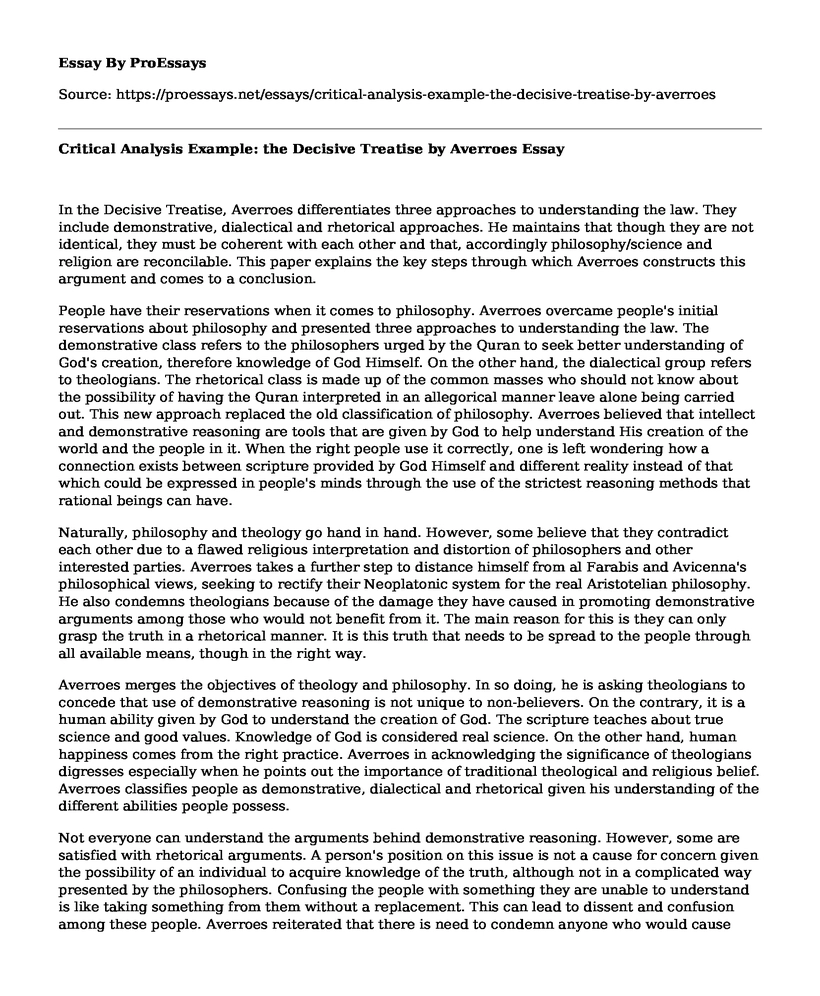In the Decisive Treatise, Averroes differentiates three approaches to understanding the law. They include demonstrative, dialectical and rhetorical approaches. He maintains that though they are not identical, they must be coherent with each other and that, accordingly philosophy/science and religion are reconcilable. This paper explains the key steps through which Averroes constructs this argument and comes to a conclusion.
People have their reservations when it comes to philosophy. Averroes overcame people's initial reservations about philosophy and presented three approaches to understanding the law. The demonstrative class refers to the philosophers urged by the Quran to seek better understanding of God's creation, therefore knowledge of God Himself. On the other hand, the dialectical group refers to theologians. The rhetorical class is made up of the common masses who should not know about the possibility of having the Quran interpreted in an allegorical manner leave alone being carried out. This new approach replaced the old classification of philosophy. Averroes believed that intellect and demonstrative reasoning are tools that are given by God to help understand His creation of the world and the people in it. When the right people use it correctly, one is left wondering how a connection exists between scripture provided by God Himself and different reality instead of that which could be expressed in people's minds through the use of the strictest reasoning methods that rational beings can have.
Naturally, philosophy and theology go hand in hand. However, some believe that they contradict each other due to a flawed religious interpretation and distortion of philosophers and other interested parties. Averroes takes a further step to distance himself from al Farabis and Avicenna's philosophical views, seeking to rectify their Neoplatonic system for the real Aristotelian philosophy. He also condemns theologians because of the damage they have caused in promoting demonstrative arguments among those who would not benefit from it. The main reason for this is they can only grasp the truth in a rhetorical manner. It is this truth that needs to be spread to the people through all available means, though in the right way.
Averroes merges the objectives of theology and philosophy. In so doing, he is asking theologians to concede that use of demonstrative reasoning is not unique to non-believers. On the contrary, it is a human ability given by God to understand the creation of God. The scripture teaches about true science and good values. Knowledge of God is considered real science. On the other hand, human happiness comes from the right practice. Averroes in acknowledging the significance of theologians digresses especially when he points out the importance of traditional theological and religious belief. Averroes classifies people as demonstrative, dialectical and rhetorical given his understanding of the different abilities people possess.
Not everyone can understand the arguments behind demonstrative reasoning. However, some are satisfied with rhetorical arguments. A person's position on this issue is not a cause for concern given the possibility of an individual to acquire knowledge of the truth, although not in a complicated way presented by the philosophers. Confusing the people with something they are unable to understand is like taking something from them without a replacement. This can lead to dissent and confusion among these people. Averroes reiterated that there is need to condemn anyone who would cause such harm in the strongest terms possible. The reason for this is that one who causes unbelief would be considered an unbeliever. On the contrary, when the common man is confused about complex verses in scripture, it is important to provide a rhetorical argument in tandem with mysterious knowledge of God. The rhetorical person should never at any point in time know that it is possible to interpret the Scripture allegorically.
In conclusion, it is clear that Averroes has done a remarkable thing concerning the relationship between philosophy and theology. As opposed to taking a defensive position, he has stated that through the Scriptures, the thinkers have a religious obligation of pursuing philosophy when they can or when it is necessary. Averroes seeks to differentiate himself as a philosopher with Aristotelian roots. In so doing, he had the ability to reconcile his new philosophy with the scripture. One thing is clear: the approach used by Averroes is not an attack on theologians as such being a rebuttal of past philosophers who had distorted the manner in which people viewed this discipline. Besides clarifying his understanding of philosophy, he went on to point out the misconception of theologians who held that Scripture and philosophy tackled two separate truths, demonstrating that where a contradiction existed, a person could establish the cause of philosophical arguments that were not sound. As far as Averroes is concerned, philosophy and theology could be perceived in the same light, casting their light different in directions. However, they both give people the opportunity to bask in the warmth of the same sun.
Work Cited
Averroes. The Book of the Decisive Treatise Determining the Connection between the Law and Wisdom. United States: Brigham Young University Press, 2001
Cite this page
Critical Analysis Example: the Decisive Treatise by Averroes. (2021, Mar 26). Retrieved from https://proessays.net/essays/critical-analysis-example-the-decisive-treatise-by-averroes
If you are the original author of this essay and no longer wish to have it published on the ProEssays website, please click below to request its removal:
- Inmate Early Release - Essay Sample
- Essay Example on Criminal Justice, Intercultural Prejudice, and Employment Opportunities
- Essay Sample on Criminal Trial: Evidence Presented by Defendant & Prosecution
- Essay Example on U.S. Supreme Court Ignores Film Industry's Artistry Until Oscars
- Essay on Technology Shaping Society: Establishing Identity Through Social Media
- Violating Patient's Confidentiality - Essay Sample
- Addiction - Research Paper Example







